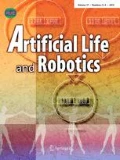Abstract
We propose a self-generating algorithm of behavioral evaluation that is important for a learning function in order to develop appropriate cooperative behavior among robots depending on the situation. The behavioral evaluation is composed of rewards and a consumption of energy. Rewards are provided by an operator when the robots share tasks appropriately, and the consumption of energy is measured during the execution of the tasks. Each robot estimates rules of behavior selection by using the evaluation generated, and learns to select an appropriate behavior when it meets the same situation. As a result, the robots may be able to share tasks efficiently even if the purpose of their task is changed by an operator in the middle of execution, because the evaluation is modified depending on the situation. We performed simulations to study the effectiveness of the proposed algorithm. In the simulations, we applied the algorithm to three robots, each with three behaviors. We confirmed that each robot can generate an appropriate behavioral evaluation based on rewards from an operator, and therefore they develop cooperative behaviors such as task sharing.
Similar content being viewed by others
References
Noreils FR (1992) An architecture for cooperative and autonomous mobile robots. IEEE International Conference on Robotics and Automation, pp 2703–2710
Kuniyoshi Y, Rougeaux S, Ishii M (1994) Cooperation by observation—the framework and basic task patterns. IEEE International Conference on Advanced Robotics '94, pp 767–774
Fukuda T, Iritani G (1995) Construction mechanism of group behavior with cooperation. IEEE International Conference on Robotics and Automation, pp 535–542
Sekiyama K, Fukuda T (1995) Adaptability enhancement of multiple robots in dynamical environment. Proceedings of the IEEE International Conference on Advance Robotics '95, pp 1656–1661
Asama H, Ozaki K, Itakura H, Matsumoto A, et al. (1991) Collision avoidance among multiple mobile robots based on rules and communication. IEEE International Workshop on Intelligent Robots and Systems '91, pp 1215–1220
Yuta S, Premvuti S (1992) Coordinating autonomous and centralized decision making to active cooperative behaviors between multiple mobile robots. IEEE International Workshop on Intelligent Robots and Systems '92, pp 1566–1574
Free JB (1987) Pheromones of social bees. Chapman and Hall, London
McFarland D (1994) Towards robot cooperation: from animal to animals 3. International Conference on Simulation of Adaptive Behavior, pp 440–444
Shibata T, Ohkawa K, Tanie K (1995) Spontaneous coordinated behavior of robots through reinforcement learning. IEEE International Conference on Neural Networks, pp 2908–2911
Yamaguchi T, Miura M, Yachida M (1995) Cooperative reinforcement learning with spontaneous mimetism. International Fuzzy Systems Association World Congress, pp 101–104
Asada M, Noda S, Tawaratsumida S, et al. (1995) Vision-based reinforcement learning for purposive behavior acquisition. IEEE International Conference on Robotics and Automation, pp 146–153
Shibata T, Ohkawa K, Tanie K (1997) Spontaneous behavior for cooperation through interaction: an emotionally intelligent robot system. Artif Life Robotics 1:105–109
Watkins C (1989) Learning from delayed rewards. PhD Thesis, Cambridge University
Author information
Authors and Affiliations
Corresponding author
About this article
Cite this article
Ohkawa, K., Shibata, T. & Tanie, K. Self-generating algorithm of evaluation for cooperative behavior. Artificial Life and Robotics 2, 138–143 (1998). https://doi.org/10.1007/BF02471171
Received:
Accepted:
Issue Date:
DOI: https://doi.org/10.1007/BF02471171




